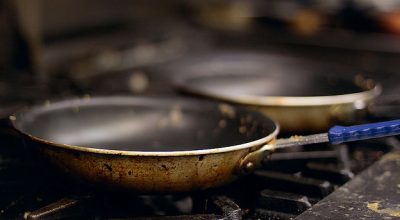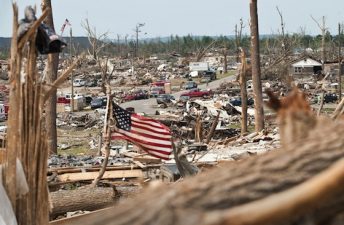
Meet Lisa, the co-founder of the world’s much loved green news media site Grist.
Just as fun as going on a press trip and seeing the heart of a country’s cleantech industry, are the other bloggers one meets on such a trip. A few months ago, during their longest days of the year I went to Helsinki, Finland. For 3 intense days a handful of us were shlepped around Helsinki by our sweet host Eeva. Each of us had various interests: I was curious about Finnish companies who could provide solar and innovative energy and water solutions to the Middle East, like Naps Systems Oy; Michael from Greentech (who was suggested by his daughter to wear underwear on his head to get sleep) reported on Finland’s Bid For Green Glory; and Lisa Hymas had her own special request: to meet Fiskers, inventor of a hearty push reel lawn mower, which she blogged about on Grist.
Taking the opportunity to get to know a little more of one of the world’s most influential green media sites, Green Prophet sits down with Lisa, asking her about Grist’s history, and how young green leaders from the Middle East can learn from Grist’s example, and be a force of change. Read on for our interview.
1. Please state your full name, place of residence (or work), and title.
Lisa Hymas, Seattle, Senior Editor at Grist.org
2. Lisa, Grist has become a major force for change in the green movement in America. Tell us a little bit about how Grist started.
 My colleague Chip Giller (left) and I started Grist in 1999. At the time, there was very little interesting environmental journalism being done, online or off. We wanted to bring environmental news and advice to a broad audience, and we definitely wanted to make sure it wasn’t boring. We hit on humor as a way to make green stories appealing, and we started to describe ourselves as “a beacon in the smog” and a source of “gloom and doom with a sense of humor.”
My colleague Chip Giller (left) and I started Grist in 1999. At the time, there was very little interesting environmental journalism being done, online or off. We wanted to bring environmental news and advice to a broad audience, and we definitely wanted to make sure it wasn’t boring. We hit on humor as a way to make green stories appealing, and we started to describe ourselves as “a beacon in the smog” and a source of “gloom and doom with a sense of humor.”
Grist originally began as a project of the Earth Day Network, but after a couple of years we spun off to become our own standalone nonprofit. At the time, the idea of a nonprofit, online journalism project might have seemed odd, but now, as media organizations are scrounging around for all kinds of new models, we look almost prescient for setting Grist up the way we did.
3. With so many resources out there: green blogs, green sections in newspapers, how does Grist – as an NGO and unique in this sphere – define itself from the others?
We’ve been at this a long time (in internet years, at least), so we’ve built up levels of expertise and access and trust that a lot of other outlets in this space don’t have. Because we’ve earned a good reputation and we reach a sizable audience, we can get access to members of the U.S. Congress and CEOs and even the occasional movie star with a green conscience. We know enough to put new developments in context. We know enough to call bullshit when we see it. We do serious journalism, but at the same time, we try to keep perspective and make sure that we still have some serious fun too.
We also work to make Grist the spot where you can come every day to find the most important or interesting happenings and discussions in the green world. Many of the new green blogs and websites that have sprung up in recent years are more narrowly focused — on green products, or cleantech, or politics, or sustainable food. And that’s great: I’m thrilled there are so many green discussions happening all over the place — finally! But it can be overwhelming for readers, so one of the things we do at Grist is point you to the most fascinating or funny things out there — whether in The Wall Street Journal or on YouTube or in more specialized blogs like Green Prophet. And we make all of it accessible to normal people, so you don’t have to be a policy wonk or a long-time treehugging activist or a solar engineer to understand what we’re talking about.
4. What do you think are the top 3 most important environment issues the world faces today?
Climate change really is a big, fat deal. It’s come to dominate environmental conversations, and with good reason — it’s intertwined with so many other issues, and steps we can take to fight climate change will have the effect of helping to solve other environmental and economic problems.
One related and critical issue is figuring out how to make city living greener. Most of the world’s population now lives in urban areas, and with the creativity and business savvy and money concentrated in cities, we have a huge opportunity to figure out how to make urban life more green — and more appealing even to people who don’t care about green. Walkable neighborhoods, public green spaces, urban gardening and farming, small-scale renewable power, smart-grid technology — there are a lot of exciting, enticing prospects.
Another huge related issue is population: The more of us there are, and the more we consume, the more daunting all of our environmental problems become. I don’t advocate population “control,” and I don’t think you’ll find many sane or humane people who do anymore; all people should be free to determine their own reproductive destinies. But we can make a difference by ensuring that everyone everywhere has easy access to contraception, and, in places where contraception is already widely available, by changing social expectations and making it OK to decide not to have kids, or to have just one.
5. What turns your “green” wheels?
My Sunday morning walk to the local farmers’ market — delicious food and happy people are all around, and it’s impossible to leave without running into friends and neighbors. The whole experience encapsulates what I love about living in my Seattle neighborhood.
6. If young environmentalists in the Middle East have the “itch” to make a change, how do you recommend they start?
Personal change (your diet, your travel habits, your energy use) is great, but it can only take you so far. Everyone should also be pushing for national change (policies that promote clean energy and energy efficiency and move us away from fossil fuels), but that can be a slow and soul-sucking process.
The sweet spot is in the middle, at the community level. Can you help start up a farmers market or a community garden in your area? Get a group of neighbors together to install solar panels all at once, maybe securing a group discount? Push your local leaders for better public transportation? Real people can make a real difference at the neighborhood or city level.
7. Who is your biggest environmental hero, and why?
 Van Jones (left). He’s a powerful speaker and activist who’s been able to bring a positive green message — that the clean-energy economy can be an engine of job growth — to audiences across the spectrum, from inner-city teenagers to policy wonks to CEOs. The right wing has tried to smear him, but he keeps going forward.
Van Jones (left). He’s a powerful speaker and activist who’s been able to bring a positive green message — that the clean-energy economy can be an engine of job growth — to audiences across the spectrum, from inner-city teenagers to policy wonks to CEOs. The right wing has tried to smear him, but he keeps going forward.
I’ll always have a soft spot for Al Gore too.
8. If you had one book everyone should read on green issues, what would it be?
Field Notes from a Catastrophe by Elizabeth Kolbert. It’s the best, most engaging piece of writing about climate change that I’ve ever read — and I’ve read a lot on the topic.
::Grist



